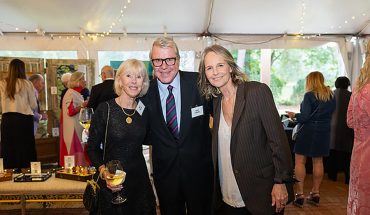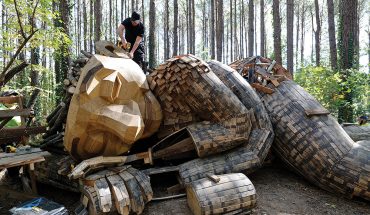
Family affair:
First row: Bill Rideout (my wife’s father), Betsy Paul (my mother), Julie (my wife), Mickey Gault (my wife’s aunt), Joy Gault-Winton (daughter of my wife’s cousin), Emma Paul (my daughter)
Second row: Allen Paul (my father), Tom Winton (husband of my wife’s cousin), me, Jock Gault (my wife’s uncle), Robin Gault-Winton (my wife’s cousin), Lee Paul (my daughter), Phyllis Rideout (my wife’s mother), and Zoe Gault-Winton (daughter of my wife’s cousin)
by Mack Paul
all images courtesy of Mack Paul
“You can’t go back home to your family, back home to your childhood … back home to places in the country, back home to the old forms and systems of things which once seemed everlasting but which are changing all the time – back home to the escapes of Time and Memory.” -Thomas Wolfe, You Can’t Go Home Again
I never dreamed my hometown would become my home.
My family left Raleigh in the late 1960s. We pulled up stakes and moved to the Washington D.C. area. At the time, Raleigh was a small town where your family’s roots in the community still mattered, and membership at the Carolina Country Club mattered a lot. My parents had migrated to Raleigh from Eastern North Carolina. Although my father quickly established himself in political circles, he remained acutely aware of his status as an outsider.
D.C., on the other hand, brimmed with post-war exuberance and opportunity. We moved into an apartment complex in Alexandria. Our neighbors came from other places. Many had spouses they met while working overseas. They shared a similar excitement about new possibilities and a sense of relief from the life they left behind.
The years of my youth passed in a blur. We moved to Fairfax County as racial strife engulfed Alexandria. The optimism of the ’60s waned, beaten down by anti-war protests and race riots, followed by the mellowness of the ’70s. The suburbs exploded in growth as the District bled – figuratively and literally.
Unfortunately, that growth did not translate into a more engaging world. Civic leaders hailed the arrival of Saks Fifth Avenue and Nordstrom as major cultural coups. Tyson’s I – a mega-mall – quickly grew outdated, superseded by a glitzier Tyson’s II.
The blandness of the suburbs caused me to question the home we had adopted during my childhood. Searching for an escape, I talked my parents into letting me visit an all-male boarding school in Alexandria.
During my interview with the head of admissions, I grew anxious as he extolled the virtues of the institution and its deep traditions. Could I possibly measure up? He looked down at my application and paused. He said with approval that a number of students shared my hometown of Raleigh. In fact, more students came from North Carolina than any other state. This fact appealed to me as a way to reconnect with my past.
Home and away
Several months later, I found myself moving into a different world defined by quirky Southern names, a strict honor code, and beach music.
Despite a desire to immerse myself in this new world, I found the transition jarring. Fortunately, I felt a particular kinship with the Raleigh contingent, and that bond helped me to assimilate. As a group, they exhibited an unusual comfort in their own skin. Most planned to attend UNC and return to Raleigh.
This struck me as odd. I found their desire to return home frustrating. How could you forego New York, London, and Paris for Raleigh? The world awaited us. At the time, I wrote them off as hopelessly myopic. I was one of three students who ventured north of the Mason Dixon Line for college and had my sights on New York City.
I did finally make it to the Big Apple to attend law school, after stints in New England and on the West Coast. Despite an epidemic of AIDS, crack, and murder in the late ’80s, New York still held an allure for me. The city’s scale and intensity of spirit managed to sustain it through this dark period. Nevertheless, to live in New York is to become a New Yorker. Its imprint on identity can be overpowering, making it difficult to find your place in a larger community.
I thought long and hard about my career and what city might afford the greatest opportunities. Law school herded us toward major firms in four or five cities. My wife pushed for San Francisco. I was inclined to return to Los Angeles. Nevertheless, I felt a sense of dread as I imagined life on a super-amped treadmill.
During my last year of law school, a radical idea popped into my head while reading a case about Duke Power. What about Raleigh? By the early ’90s, it had gained national attention on many lists of “Best Places.” Even from New York, I was aware of the press and notoriety. However, it wasn’t “Raleigh.” To the world, Raleigh was now “the Triangle” or “Raleigh-Durham,” as boosters liked to say at the time.
Raleigh’s self-deprecating strategy to go regional came at an opportune time. As a generation of “knowledge workers” began to make locational decisions based on the constellation of universities, high-tech jobs, and quality of life, the Triangle found itself on the list with mid-tier cities like Austin, Minneapolis, Portland, and Nashville. Suddenly, Raleigh was on the fast track as one of the nation’s hot spots.
I began visiting the area, reconnecting with old friends and relatives. After a few visits, my wife and I decided to take a leap of faith in 1991. We settled in Boylan Heights, which, at the time, was on the urban frontier.
Despite the national hype, I quickly learned that the Triangle of the early ’90s – dubbed “Nerdistan” by one author – primarily excelled as a place for those who worked in the Park and lived in Cary or North Raleigh. The areas that made Raleigh unique languished.
A good life
We had our moments of doubt. At times I wondered whether Raleigh would follow the same path I experienced growing up in Northern Virginia. But as our children arrived, we began to appreciate the benefits of the area. Unlike other cities where schools drew families to the suburbs, Wake County offered us a base, magnet, and charter school with stellar academics in the downtown area.
Our daughters never faced the displacement caused by social unrest. Although many of their friends commuted from Cary, they developed friendships that carried through elementary to middle to high school. Their various activities took them to gyms, pools, and soccer fields throughout the area, exposing them to a wider, diverse community.
As they grew up, reinvestment in Raleigh’s core went from a trickle to a roar. Downtown now exudes an authentic cast of new and old. Gleaming office towers on Fayetteville Street give way to crusty shop fronts on Wilmington Street. Our daughters can navigate this world without a mental map that says certain areas must be avoided.
Since our arrival, we have watched residents pour into the region. In many ways, they exhibit an excitement similar to that I encountered in Alexandria years ago. However, Raleigh transplants arrive for very different reasons. Instead of escaping a home of “old forms and systems of things,” they seek relief from decaying industries, stratospheric housing prices, long commutes, and urban sprawl. No longer is the exodus from rural areas to the big city. A new demographic pattern has emerged: from big cities to civilized ones.
In 1893, Frederick Jackson Turner gave a lecture that became known as the “Turner Thesis.” He argued that the American frontier had come to an end. The 1890 census supported the notion there were no new territories to settle. America’s identity forged by the expansion west and the individuality, independence, and self-sufficiency required by the frontier would be forever altered.
Another frontier has closed. As the 21 century unfolds, the vast majority of Americans live in metropolitan areas. As we enter the Age of the City, we leave behind the notion of “home” understood by Thomas Wolfe and eons of generations who came before him. No longer will upstarts escape the old forms of the country to make their way in the city. More likely, they will migrate from one metropolitan area to another or simply stay put.
Several years ago, my parents returned to Raleigh. My in-laws recently moved here from Los Angeles. Siblings may not be far behind.
In two generations, my family’s relationship to Raleigh embodies the new demographic shift. We escaped the confines of a bygone era only to return to a place where “new forms” exist in a vibrant downtown: greenways, quality schools, and, most importantly, economic opportunity. Through continued foresight, it can remain home for many generations to come.
Mack Paul is a partner at Morningstar Law Group. He served as chairman of the Wake County Democratic Party from 2010-2011.




